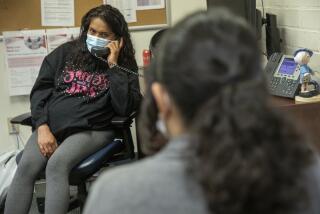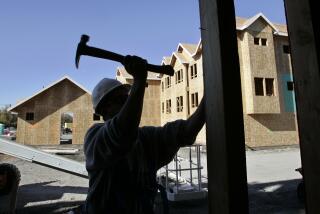Class-Action Suit Seeks Call Boxes Equipped for Deaf
- Share via
When a tire flew across the freeway and smashed into his car, Daniel Arellanes quickly parked, left his injured girlfriend and ran across several lanes of traffic toward a call box in a desperate attempt to get help.
Being deaf, and noticing that the box was not equipped with a teletypewriter, Arellanes tried yelling into the phone and banging the headset against the box, thinking the noise would draw help.
Finally, he left the phone off the hook.
The California Highway Patrol arrived one hour later -- whether intentionally or by chance is unclear -- and it took another hour for a tow truck and ambulance to arrive.
Arellanes and Victoria Munoz, who is also deaf, are plaintiffs in a class-action suit, filed in April in San Francisco, that aims to widen the use of teletypewriters, or TTYs, in highway call boxes.
“I didn’t get upset until after waiting an hour,” Munoz said in an interview through a relay operator. “I got panic and anxiety worrying about internal bleeding.”
The suit names the state Department of Transportation and its director, the CHP and its commissioner, and 15 counties as defendants.
In those counties, from Del Norte in the north to Imperial in the south, nearly all 5,458 call boxes are inaccessible to deaf and hard-of-hearing motorists.
“We feel that it’s pretty clear that a call box isn’t completely accessible unless it has a TTY,” said Jennifer Pesek, an attorney for the California Center for Law and the Deaf, one of the law firms handling the case.
Throughout California, more than 16,000 of the yellow call boxes line the highways. Of those, 6,246 are accessible to the deaf and hard-of-hearing in Ventura, Los Angeles and Orange counties.
A national call box standard does not exist, Pesek said, and because each county administers its own call boxes, it is difficult to get consistent service.
“Right now, it’s a state-by-state issue,” Pesek said. “We are hoping -- it seems pretty likely -- that in three or four years we will have a national regulation.”
The U.S. Access Board, a federal agency, is reviewing a regulation that would call on states to upgrade call boxes with TTYs.
In general, call boxes are solar-powered cellular phones with a link to the CHP. Services are funded in participating counties by a $1 fee assessed by the Department of Motor Vehicles on vehicle registration.
Because call boxes are a public service, the lawsuit argues, people with disabilities cannot be denied access to them. Doing so violates both federal and California law, the suit contends.
“[Having] TTYs on the call boxes would make it easier for us all,” Munoz said. “I have three deaf children and one hard-of-hearing grandchild. I don’t want the same to happen to them.”
The Metropolitan Transportation Commission, which comprises nine counties in the Bay Area, decided to upgrade its 2,650 call boxes so it would not be named in the lawsuit, said Kenneth Kao, program coordinator for the Bay Area’s Service Authority for Freeways and Expressways.
The commission includes Contra Costa County, where the accident involving Munoz and Arellanes occurred.
Santa Cruz, Monterey and San Diego counties also are planning to upgrade call boxes, Pesek said.
The Kern Council of Governments, one of the defendants in the suit, is beginning the process of modifying its 574 call boxes.
“We’ve been working on this a number of years,” said Darrel Hildebrand, assistant director of the council. “We were accumulating the money to do the work.”
The council’s governing board is scheduled to vote today on whether to appropriate up to $1.65 million to add TTYs to call boxes in the county and upgrade them from analog technology to digital.
In order for a county to be dismissed from the suit, the Center for Law and the Deaf is asking county officials to agree to install TTY technology and set a timetable of about 12 to 18 months for doing so.
“We are prepared to go to court if we need to,” Pesek said. “But we’re really hoping for a resolution.”
In 1996, Ventura County spent $325,000 to install TTY equipment on its 550 call boxes. “We’ve been trying to take a proactive approach on disabled issues,” said Kerry Forsythe, deputy director for the Ventura County Transportation Commission.
Los Angeles County took a reactive approach in 1999 when, in response to a lawsuit by four disabled people, it spent $4 million to make its 4,470 call boxes accessible to the deaf and disabled.
Orange County, acting to avoid a possible suit, finished equipping its 1,226 call boxes with TTYs in 2002. The project cost $3 million.
More to Read
Sign up for Essential California
The most important California stories and recommendations in your inbox every morning.
You may occasionally receive promotional content from the Los Angeles Times.










